#Factory farming and global warming
Explore tagged Tumblr posts
Text
Factory Farming and Global Warming: Understanding the Environmental Impact

Factory farming, a dominant method of agricultural production worldwide, has increasingly come under scrutiny due to its significant contribution to global warming. This intensive farming practice involves raising livestock such as poultry, cattle, and pigs in tightly confined spaces, often indoors, to maximize production efficiency. While efficient in meeting the demands of a growing global population, factory farming exacts a heavy toll on the environment, particularly through global warming.
The primary environmental concern associated with factory farming is its substantial greenhouse gas emissions. Livestock raised in these facilities produce methane, a potent greenhouse gas that contributes significantly to global warming. Methane is released through processes like enteric fermentation in ruminant animals and manure decomposition. In addition to methane, factory farms also emit nitrous oxide, another potent greenhouse gas, primarily from animal waste management.
Moreover, the industrial-scale production of livestock in factory farms necessitates vast amounts of resources. This includes land for growing feed crops like corn and soy, which often involves deforestation and habitat destruction, further exacerbating global warming. Additionally, the intensive use of water and fossil fuels for operations such as feed production, animal transportation, and waste management contributes to carbon dioxide emissions, compounding the environmental impact.
Factory farming also poses risks to biodiversity and ecosystem health. The concentration of large numbers of animals in confined spaces increases the likelihood of disease outbreaks, which can necessitate the use of antibiotics and other chemicals. These substances can leach into soil and water systems, negatively affecting local ecosystems and wildlife. Furthermore, the runoff from animal waste, containing nutrients like nitrogen and phosphorus, contributes to water pollution and harmful algal blooms, further damaging aquatic ecosystems.
Addressing the environmental impact of factory farming requires concerted efforts across multiple fronts. Transitioning towards sustainable agricultural practices, such as pasture-based farming and agroecology, can significantly reduce the carbon footprint of meat and dairy production. These methods prioritize animal welfare, biodiversity conservation, and soil health while minimizing greenhouse gas emissions associated with global warming.
Consumers also play a crucial role in mitigating the environmental impact of factory farming. Choosing locally sourced, organic, and sustainably produced food can reduce the demand for products from intensive farming operations. Supporting policies and initiatives that promote sustainable agriculture and regulate greenhouse gas emissions from livestock production are also essential steps towards combating global warming exacerbated by factory farming.
In conclusion, while factory farming meets the demand for affordable meat and dairy products globally, its environmental impact, particularly on global warming, cannot be overlooked. The intensive production methods and associated greenhouse gas emissions pose significant challenges to environmental sustainability and climate resilience. By promoting sustainable agricultural practices and making informed consumer choices, individuals and communities can contribute to reducing the environmental footprint of factory farming and mitigating global warming effects on a global scale.
2 notes
·
View notes
Text
Iowa Factory Farms Penalized Less Than $750K For 10 Years Of Illegal Pollution, New Analysis Finds
https://www.foodandwaterwatch.org/2024/12/09/iowa-factory-farms-penalized-less-than-750k-for-10-years-of-illegal-pollution-new-analysis-finds/
#iowa news#iowa#factory farms#farms#pollution#climate change#global warming#science#usa is a terrorist state#usa is funding genocide#usafashion#usaclothing#usahoodie#usa politics#usa#american indian#american#america#ausgov#politas#auspol#tasgov#taspol#australia#fuck neoliberals#neoliberal capitalism#anthony albanese#albanese government#pollutants#polluted air
3 notes
·
View notes
Photo

One of the most important things that you can do to fight climate change is to switch to plant based foods.
#earth day#climate change#global warming#earth#climate change is real#factory farms#go green#vegan#the cow in the room#pictures#reality#activism#food#be the change#climate emergency
6 notes
·
View notes
Text
Olivia Rosane: World Bank Leads Development Giants in Investing $2.27 Billion in Factory Farms
Pigs stand in their pens at a farm in Zhuji, east China’s Zhejiang province on March 2, 2011. (Photo: STR/AFP via Getty Images) . “We’re calling on World Bank President Ajay Banja to phase out these investments, which are undermining his climate agenda,” said one researcher. The Green Climate Fund and 11 of the 15 multilateral development banks together invested at least $2.27 billion in…
#Ajay Banja#climate change#factory farms#global warming#greenhouse gases#International Monetary Fund#World Bank
0 notes
Text
Excerpt from this story from Rolling Stone:
EARLIER THIS WEEK, the Copernicus Climate Change Service, a European Union-funded research group, announced that last Sunday, July 21, 2024, the daily global average temperature hit 62.76 degrees. It was the hottest day scientists have measured since 1940 — which officially makes it the hottest day ever recorded on Earth by humans. Twenty four hours later, however, Copernicus had to update its report: On Monday, the temperature climbed up to 62.87 degrees. As of now, July 22, 2024 is now the hottest day ever recorded.
But hey, it’s only Friday. Who knows what the weekend holds? Or the rest of the summer, for that matter.
Are you shocked by news of this record-breaking heat? Does the fact that you lived through two of the hottest days on Earth that scientists have ever recorded make you think differently about the risks and consequences of living on a rapidly-warming planet? Did you pause for a moment and think about the millions of people who sweat through this without air conditioning? Did you mourn the 396 deaths from heat that are under investigation this summer in Phoenix? Did you sell your car and buy an electric bike? Were you inspired to sign up to knock on doors to help Kamala Harris defeat the climate-hoax-pushing-criminal Donald Trump? Are you getting calls from your MAGA-loving uncle in Idaho apologizing for the long lecture he gave you at Thanksgiving last year about how Earth’s temperature moves in natural cycles, or about how higher levels of CO2 in the atmosphere is good because more CO2 makes crops and trees grow better?
Probably not.
The problem is not you. The problem is that a broken heat record is just another statistic. The story of the climate crisis is written in broken records that measure levels of CO2 pollution, glacial ice melt, rising sea levels, crop failure, megafires, the spread of diseases, heat deaths, wildfire and insurance costs, and economic losses. But if shocking data and broken records could galvanize people to take action on climate, we’d all be powering our iPhones with solar power from microgrids, and millions of cows and chickens would be liberated from factory farms. We’d have cities crowded with bike lanes and a high speed rail service between Dallas and Houston. We’d laugh at climate-hoaxing politicians and debate whether it is fair and just to charge Big Oil companies with criminally negligent homicide.
43 notes
·
View notes
Text
Ngl one of the reasons I've become a vegetarian outside of the global warming reasons is just the horrors of factory farming and whatnot.
I have visited some factory farms and even interned on a two-star pig farm (had to do this for college) and it's just. Terrible. The smell, the lack of fresh air, the dead piglets in the hallways, the lack of space and free range for the animals. It's awful.
Like sure I've seen the documentaries and read the books on how awful things are but experiencing them yourself ads another layer.
7 notes
·
View notes
Text
What if Animal Crossing was an animated TV show? Well, I think the answer would be this:
Prologue:
Since this story will be very interesting, there would be a lot of things to start here. But first, I want you to picture this: The year is 2051. The human population of Earth has grown by about 92% percent since the end of the last century, which has impacted the planet more dramatically with climate change, pollution, deforestation, habitat destruction, global warming, the large amount of greenhouse gases, and especially the heavy usage of technology and artificial intelligence to make the planet more human-sustainable than ever. We destroy entire forests to build farms and factories. We pollute the air with chemicals and we drink entire oceans in little plastic bottles. Most of Earth’s population is crammed with humans, robots, dogs, cats, bees, livestock, and… video game characters? Wait a minute… what are we doing to the planet? Why do we have to do this? Why do we exist? Why can’t we just be normal to ourselves instead of being cruel to this peaceful planet? And wait, did we just say “video game characters”? Well, of course, since the people of our generation like gaming, we can bring video game characters to life now using the special advanced technology that we have created for the last few years, so we can make everyone feel welcomed(I mean, what’s the worst that could happen?).
Anyways, on to the Animal Crossing story. It’s set in the same universe that we talked about above. The story is set in the Bronx borough in New York City in 2051. It is a cold November night. A boy and his scientist parents, who are the last remaining members of their family to survive the apocalypse in the mountains of man-made debris, have found themselves in a situation where they are unable to find their way back to their home in time to escape from the darkness of the world. While attempting to find a way to escape, the lone survivors found themselves some ancient objects that they’ve never seen before, including a mysterious Nintendo Switch that has been induced in some special advanced alien technology.
#perlamaritr1#animal crossing#artists on tumblr#games#video games#nintendo#my post#lol#memes#funny#animal crossing pocket camp#animal crossing new horizons#acnh#we need an animal crossing tv show#tv show ideas#tv shows#animal crossing and the other worlds#writeblr#writers on tumblr#writing
8 notes
·
View notes
Text

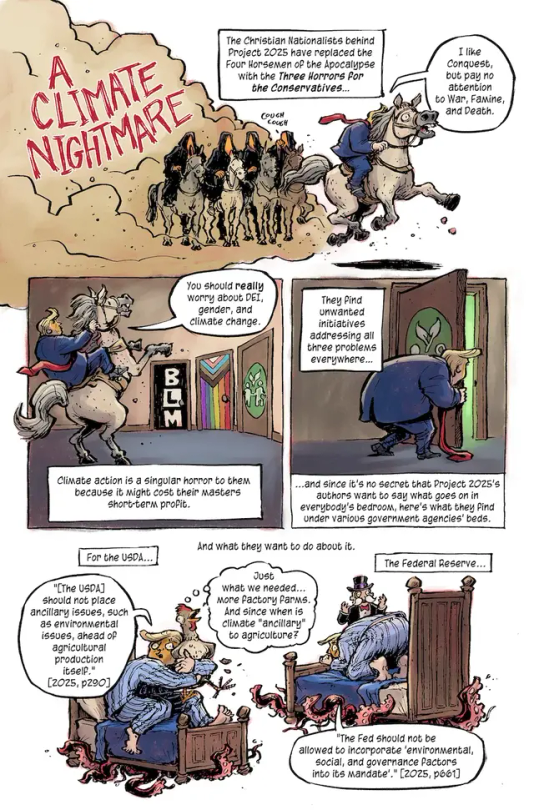
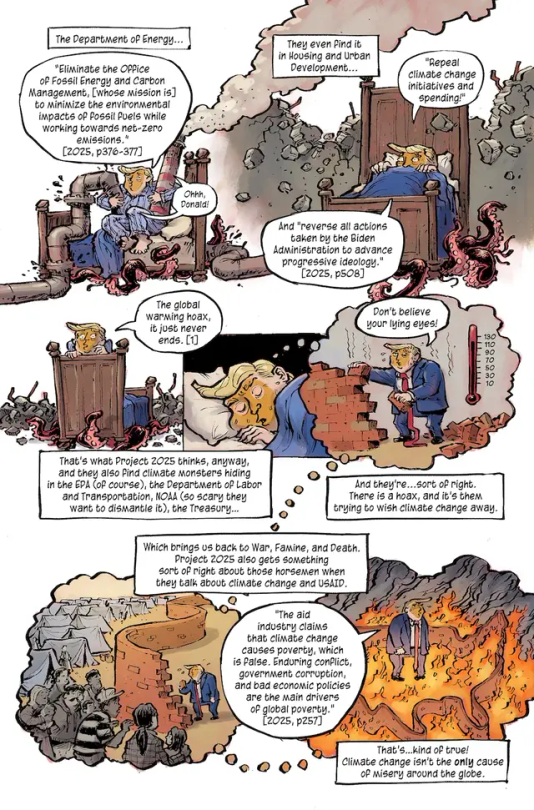

CLIMATE
PAGE ONE
Panel 1
Trump, on a horse, charges toward the reader in front of four other horses — the apocalyptic riders from Revelations. The riders are hooded, and one is coughing in the dust Trump’s horse is kicking up.
CAPTION:
The Christian Nationalists behind Project 2025 have replaced the Four Horsemen of the Apocalypse with the Three Horrors for the Conservatives…
TRUMP:
I like Conquest, but pay no attention to War, Famine, and Death.
Panel 2
Trump and his horse both rear back in fear as they come to three doors. One has a Black Lives Matter flag, one has the Progress Pride flag, and the third shows a climate action icon.
TRUMP:
You should really worry about DEI, gender, and climate action.
CAPTION:
Climate action is a singular horror to them because it might cost their masters short-term profit.
Panel 3
Trump tentatively opens the climate door.
CAPTION:
They find unwanted initiatives addressing all three problems everywhere…
CAPTION:
…and since it’s no secret that Project 2025’s authors want to say what goes on in everybody’s bedroom, here’s what they find under various government agencies’ beds.
Panel 4
In one half of this panel, Trump is in bed, hugging a chicken in fear. The chicken looks unhappy. From beneath the bed, pink tentacles stretch upward toward Trump. In the other half of this panel,
CAPTION:
And what they want to do about it.
CAPTION:
For the USDA…
TRUMP:
“[The USDA] should not place ancillary issues, such as environmental issues, ahead of agricultural production itself.” [2025, p. 290]
CHICKEN THOUGHT BALLOON:
Just what we needed…more factory farms. And since when is climate “ancillary” to agriculture?
Panel 5
Trump is joined in the bed by a Mr. Moneybags figure in a top hat and monocle. Trump sucks his thumb, terrified of the outstretched tentacles.
CAPTION:
The Federal Reserve…
TRUMP:
“The Fed should not be allowed to incorporate ‘environmental, social, and governance factors into its mandate’.” [2025, p. 661]
PAGE TWO
Panel 1
Trump remains in the tentacle-surrounded bed, still fearful, hugging a dribbling oil pipeline with one arm and a coal smokestack with the other.
CAPTION:
The Department of Energy…
TRUMP:
“Eliminate the Office of Fossil Energy and Carbon Management, [whose mission is] to minimize the environmental impacts of fossil fuels while working towards net-zero emissions.” [2025, p. 376-377]
SMOKESTACK and PIPELINE (together):
Ohhh, Donald!
Panel 2
Trump hides beneath the covers of the bed as the walls around him crumble.
CAPTION:
They even find it in Housing and Urban Development…
TRUMP:
“Repeal climate change initiatives and spending!”
TRUMP:
And “reverse all actions taken by the Biden Administration to advance progressive ideology.” [2025, p. 508]
Panel 3
Trump peers over the headboard of the bed. The walls have fully crumbled at his feet.
TRUMP:
The global warming hoax, it just never ends. [1]
CAPTION:
That’s what Project 2025 thinks, anyway, and they also find climate monsters hiding in the EPA (of course), the Department of Labor and Transportation, NOAA (so scary they want to dismantle it), the Treasury…
Panel 4
Trump is finally asleep and dreaming. A thought balloon stretches from his mind with a dream image of him building a wall, sweating as he does so, a brick in one hand. Next to him, a thermometer reads 110 degrees.
TRUMP (in dreams):
Don’t believe your lying eyes!
CAPTION:
And they’re…sort of right. There is a hoax, and it’s them trying to wish climate change away.
Panel 5
In another dream thought balloon, we see Trump continuing to build his wall while refugees approach, their tents stretching back to the horizon.
CAPTION:
Which brings us back to War, Famine, and Death. Project 2025 also gets something sort of right about those horsemen when they talk about climate change and USAID.
Panel 6
In another dream thought balloon, Trump stands in the middle of a burning map of the United States, its borders constructed entirely of brick walls.
TRUMP:
“The aid industry claims that climate change causes poverty, which is false. Enduring conflict, government corruption, and bad economic policies are the main drivers of global poverty.” [2025, p257]
CAPTION:
That’s…kind of true! Climate change isn’t the only cause of misery around the globe.
PAGE THREE
Panel 1
Trump shakes hands with Vladimir Putin.
CAPTION:
Enduring conflict is a cause of poverty.
TRUMP:
You didn’t pay? … I would not protect you. In fact, I would encourage [Russia] to do whatever the hell they want. [2]
Panel 2
A close-up of Trump’s mugshot. He is wearing an orange jumpsuit.
CAPTION:
So is government corruption.
Panel 3
Trump stands at a podium during one of his rallies. Behind him, supporters hold up signs with slogans like “Drill Baby Drill,” “Deport Illegals,” and “Make America Great Again.”
CAPTION: And so are bad economic policies.
TRUMP: I’ll get rid of the Green New Scam. And we’re gonna drill, baby, drill. [3,4]
Panel 4
Trump stands alone at the same podium, but around him we see only a roaring fire.
CAPTION: That’s your climate future under Trump and Project 2025. The bad news: you can already feel the heat.
CAPTION: The good news: you can vote for a better future.
SOURCES
[1] “Trump muses on war with Russia and praises Kim Jong Un,” by Josh Dawsey, The Washington Post, March 6, 2022, https://www.washingtonpost.com/nation/2022/03/06/trump-focuses-foreign-policy-speech-gops-top-donors/
[2] “Fact-checking Trump’s comments urging Russia to invade ‘delinquent’ NATO members,” by AP, PBS News, February 12, 2024, https://www.pbs.org/newshour/politics/fact-checking-trumps-comments-urging-russia-to-invade-delinquent-nato-members
[3]
“A second Trump term could slow the shift from fossil fuels as climate threats grow,” by Michael Copley, Morning Edition (NPR), June 25, 2024, https://www.npr.org/2024/06/25/nx-s1-5006573/trump-election-2024-climate-change-fossil-fuels
[4]
“Trump pledges to scrap offshore wind projects on ‘day one’ of presidency,” by Oliver Milman, The Guardian, May 13, 2024, https://www.theguardian.com/us-news/article/2024/may/13/trump-president-agenda-climate-policy-wind-power
[2025] “Mandate for Leadership: The Conservative Promise,” by The Heritage Foundation, 2023, https://static.project2025.org/2025_MandateForLeadership_FULL.pdf
4 notes
·
View notes
Text
Factory Farming and Global Warming: Understanding the Environmental Impact

Factory farming, a dominant method of agricultural production worldwide, has increasingly come under scrutiny due to its significant contribution to global warming. This intensive farming practice involves raising livestock such as poultry, cattle, and pigs in tightly confined spaces, often indoors, to maximize production efficiency. While efficient in meeting the demands of a growing global population, factory farming exacts a heavy toll on the environment, particularly through global warming.
The primary environmental concern associated with factory farming is its substantial greenhouse gas emissions. Livestock raised in these facilities produce methane, a potent greenhouse gas that contributes significantly to global warming. Methane is released through processes like enteric fermentation in ruminant animals and manure decomposition. In addition to methane, factory farms also emit nitrous oxide, another potent greenhouse gas, primarily from animal waste management.
Moreover, the industrial-scale production of livestock in factory farms necessitates vast amounts of resources. This includes land for growing feed crops like corn and soy, which often involves deforestation and habitat destruction, further exacerbating global warming. Additionally, the intensive use of water and fossil fuels for operations such as feed production, animal transportation, and waste management contributes to carbon dioxide emissions, compounding the environmental impact.
Factory farming also poses risks to biodiversity and ecosystem health. The concentration of large numbers of animals in confined spaces increases the likelihood of disease outbreaks, which can necessitate the use of antibiotics and other chemicals. These substances can leach into soil and water systems, negatively affecting local ecosystems and wildlife. Furthermore, the runoff from animal waste, containing nutrients like nitrogen and phosphorus, contributes to water pollution and harmful algal blooms, further damaging aquatic ecosystems.
Addressing the environmental impact of factory farming requires concerted efforts across multiple fronts. Transitioning towards sustainable agricultural practices, such as pasture-based farming and agroecology, can significantly reduce the carbon footprint of meat and dairy production. These methods prioritize animal welfare, biodiversity conservation, and soil health while minimizing greenhouse gas emissions associated with global warming.
Consumers also play a crucial role in mitigating the environmental impact of factory farming. Choosing locally sourced, organic, and sustainably produced food can reduce the demand for products from intensive farming operations. Supporting policies and initiatives that promote sustainable agriculture and regulate greenhouse gas emissions from livestock production are also essential steps towards combating global warming exacerbated by factory farming.
In conclusion, while factory farming meets the demand for affordable meat and dairy products globally, its environmental impact, particularly on global warming, cannot be overlooked. The intensive production methods and associated greenhouse gas emissions pose significant challenges to environmental sustainability and climate resilience. By promoting sustainable agricultural practices and making informed consumer choices, individuals and communities can contribute to reducing the environmental footprint of factory farming and mitigating global warming effects on a global scale.
0 notes
Text
Earth Day 2024
April 21, 2024, update: . . . " the average global temperature on Earth has increased by at least 1.2° Celsius (1.9° Fahrenheit) since 1880 (it increased 0.4° Celsius since 2016). There is only 0.3° Celsius of increase left before we hit the first tier of cataclysmic thresholds, according to environmental scientists.
According to an ongoing temperature analysis led by scientists at NASA’s Goddard Institute for Space Studies (GISS), "the average global temperature on Earth has increased by at least 1.2° Celsius (1.9° Fahrenheit) since 1880 (it increased 0.4° Celsius since 2016). The majority of the warming has occurred since 1975, at a rate of roughly 0.15 to 0.20°C per decade. . . . . The data reflect how much warmer or cooler each region was compared to the base period of 1951-1980. (The global mean surface air temperature for that period was 14°C (57°F), with an uncertainty of several tenths of a degree.)"
Adding to this is the growing number of methane sinkholes, each releasing several gigatons of gas per day. This growing phenomenon is changing all the current climate projections. Indeed, we might already have reached the climate tipping point.
There was a time when we believed that we were the center of the universe and that we should have dominion over the Earth. But then Copernicus came along, who asserted that the Sun is indeed the center of our solar system, the Moon being the only body that revolved around the Earth. I'm sure you know that this resulted in a bit of an uproar. As for the dominion idea, our use of resources, overhunting, and factory farming of animals has contributed to climate change and the current sixth extinction. Watch Marvin Gaye's video, Mercy, Mercy Me (The Ecology), released in 1971.
The following two photos show a contrast between Greenland's Tunu Glacier in 1933 and 2013. This melt-back is characteristic of ice all around the world, though melt-back varies widely, depending on location.
Source:
The Greenland Ice Sheet - 80 years of climate change seen from the air.
/ Bjørk, Anders Anker; Kjær, Kurt H.; Larsen, Nicolaj Krog; Kjeldsen, Kristian Kjellerup; Khan, Shfaqat Abbas; Funder, Svend Visby; Korsgaard, Niels Jákup. 2014. Abstract from 44th International Arctic Workshop, Boulder, Colorado, United States.
It wasn't so long ago that Carl Sagan and climate scientists started sounding the alarm that we were going down a dangerous path. Subsequent climate data has revealed that those early projections vastly underestimated what was happening, since we now know that climate change is not a linear but an exponential process. That is, it happens faster and faster over time.
Via Voyager 1 (click to enlarge)
The now famous photograph of Earth as a pale blue dot was taken on February 14, 1990 by the deep space probe, Voyager 1, from a record distance of about 6 billion kilometers (3.7 billion miles). The more recent
Via Cassini
photograph was taken by the deep space probe, Cassini. Though more striking with Saturn in the foreground, it also shows how Earth is but a spec in the cosmos. As Sagan said in his book: Look again at that dot. That's here. That's home. That's us. On it everyone you love, everyone you know, everyone you ever heard of, every human being who ever was, lived out their lives. (Carl Sagan, The Pale Blue Dot, 1994)
People often say we have to save the Earth. Not so! The Earth will go on just fine without us. The issue is preserving the current biosphere that supports us and the other higher vertebrates. There will always be life on the planet so long as there's liquid water. As I present every year, here is my fictionalized account of our worst scenario. Let's do better!
8 notes
·
View notes
Text


Legislate or Die?
Governments of the industrialised countries signed a treaty in 1987, the Montreal Protocol, agreeing to halve the production of CFC’s (Chlorofluorocarbons, which damage the ozone layer causing global warming) by the year 2000. But it would take an 85% reduction to enable the ozone layer to repair itself. Acid rain is similarly being ‘tackled’: too little, too late, with the root causes being neglected. Similarly, the Earth Summits at Rio (1991), and Kyoto (2001), achieved little beyond needlessly destroying yet more rainforest to produce the tons of documents for them.
Lead-free petrol supposedly makes car exhausts okay, but cars are still major polluters and profoundly anti-social, killing 6000 people a year in Britain and injuring 40,000. The Conservative Government’s conversion to environmentalism in the 1990s (e.g. its marginal ‘green taxes’) were window dressing: the expansion of nuclear power and reprocessing was presented as green, not contributing to global warming (sic), in contrast to ‘dirty’ coal fired power stations. The reality is that nuclear power leads to radiation at all stages of the nuclear chain, but is more easily controlled by the State, as well as providing material for nuclear weapons. Despite the green promises of New Labour, in power Blair’s government have managed things for Capital. The introduction of GM crops under the guise of ‘trials’ despite mass opposition (including direct action) is a prime example. The reality of the dynamic of political power is that governments have power over the working class, and always use that power in the interests of Money.
Take the example of agriculture: in the “developed” world, it is mostly large-scale industrialised agribusiness. The emphasis is on growing single crops in huge fields — monoculture – creating an unstable ecosystem. The crops are much more vulnerable to pests, necessitating chemical pesticides. Chemical fertilisers are used to obtain (short term) high yields, in the long term these deplete the soil of nutrients and yields fall. Pesticides kill both pests and the creatures that prey on them, they also poison food and drinking water. Factory farming — concentration camps for animals — is morally indefensible, and produces unhealthy meat, eggs and milk. There is massive, government-subsidised over-production (leading to examples such as the famous butter mountains and wine lakes). This food is fed back to animals, producing delights such as CJD (‘mad cow’ disease, and foot-and-mouth) or destroyed. It’s more economic in capitalist terms, than selling it cheaply, or giving it to the millions of malnourished and starving people who need it. The Big Food-Big Government axis periodically tries to force famine-stricken countries to accept GM maize, knowing its seed stocks will be hopelessly polluted by GM contamination. Farmers are paid to keep good land fallow in order to keep prices high; food is stockpiled or destroyed for the reason.
#anarcho-communism#anarcho-primitivism#anti-capitalism#capitalism#class#class struggle#climate crisis#colonialism#deep ecology#ecology#global warming#green#Green anarchism#imperialism#industrialization#industrial revolution#industrial society#industry#mutual aid#overpopulation#poverty#social ecology#anarchism#anarchy#anarchist society#practical anarchy#practical anarchism#resistance#autonomy#revolution
2 notes
·
View notes
Text
How to explore Global warming

Global warming refers to the long-term rise in Earth's average surface temperature due to human activities, primarily the release of greenhouse gases such as carbon dioxide (CO2), methane (CH4), and nitrous oxide (N2O). These gases trap heat in the Earth's atmosphere, leading to a "greenhouse effect," which causes the planet to warm over time.
Causes of Global Warming:
Burning of Fossil Fuels: The combustion of coal, oil, and natural gas for energy and transportation releases large amounts of CO2 into the atmosphere.
Deforestation: Trees absorb CO2, and cutting them down reduces this capacity, while burning or decaying trees releases stored carbon.
Industrial Activities: Factories and other industrial processes emit various greenhouse gases.
Agriculture: Farming, particularly livestock production, produces methane, a potent greenhouse gas.
Waste Management: Decomposition of organic waste in landfills also releases methane.
Effects of Global Warming:
Rising Temperatures: Global average temperatures have increased by approximately 1.1°C (2°F) since the late 19th century, with significant consequences for ecosystems and weather patterns.
Melting Ice and Rising Sea Levels: Ice caps and glaciers are melting, contributing to rising sea levels, which threaten coastal communities.
Extreme Weather Events: Global warming increases the frequency and severity of extreme weather events, such as hurricanes, heatwaves, droughts, and heavy rainfall.
Impact on Ecosystems: Warmer temperatures affect biodiversity, with species migrating or going extinct, altering ecosystems.
Health Impacts: Heatwaves, air pollution, and changing disease patterns (e.g., the spread of tropical diseases) are increasing due to warmer conditions.
Mitigation and Adaptation:
Reducing Greenhouse Gas Emissions: Shifting to renewable energy sources like solar, wind, and hydropower, as well as improving energy efficiency, can help reduce emissions.
Carbon Sequestration: Reforestation and afforestation, as well as emerging technologies like carbon capture and storage (CCS), can remove CO2 from the atmosphere.
Climate Adaptation: Communities are developing strategies to cope with the impacts of global warming, such as building sea walls to protect against rising sea levels or altering agricultural practices to cope with changing climate conditions.
International Cooperation: Agreements like the Paris Agreement aim to limit global warming to well below 2°C, ideally 1.5°C, to avoid catastrophic climate change.to wellbeing threats.
#climate change#global#artists on tumblr#naruto#pets#usa#india#fullmetal alchemist#nature#buddy daddies
3 notes
·
View notes
Text
"Factory Farming: Cruelty Impacting Humans, Animals, and the Planet"

Factory farming, the industrialized production of livestock, has dire consequences for humans, animals, and the planet. For animals, it means a life of suffering in overcrowded, unsanitary conditions, often without access to natural behaviors or environments. Chickens, pigs, and cows endure unimaginable stress, injuries, and premature deaths, all for the sake of maximizing efficiency and profit.
For humans, factory farming poses significant health risks. The overuse of antibiotics in livestock to promote growth and prevent disease leads to antibiotic-resistant bacteria, posing a serious threat to public health. Workers in these facilities face dangerous conditions, exposure to harmful chemicals, and exploitative labor practices. Furthermore, communities near factory farms suffer from polluted air and water, leading to respiratory problems and other health issues.
Environmentally, factory farming is a major contributor to climate change, deforestation, and biodiversity loss. It generates large amounts of greenhouse gases, particularly methane from cattle, which significantly impacts global warming. Additionally, the industry consumes vast quantities of water and contributes to soil degradation and water pollution through runoff of animal waste and chemicals.
In summary, factory farming's quest for profit comes at an enormous cost to animal welfare, human health, and the environment. Sustainable and humane alternatives are essential for a healthier, more ethical future.
#Milk production abuse#Aquaculture cruelty#Duckling farming suffering#Commercial fishing cruelty#Pig slaughterhouse suffering#Confined chicken abuse#Beef cow mistreatment#Bycatch cruelty#Duck farming suffering#Industrial fishing brutality#Piglet crate abuse#Free-range eggs cruelty#Dairy cow exploitation#Farmed fish suffering#Duckling farming cruelty#Sustainable fishing cruelty#Piglet factory farming#Ethical chicken farming#Grass-fed beef cruelty#Marine bycatch suffering#Duckling farming abuse#Piglet confinement suffering#Organic dairy cruelty
2 notes
·
View notes
Text
The California-to-Texas War: A Dark Near-Future Political Drama/War Game
I read a complaint somewhere that mainstream realistic fiction isn't political enough so I decided to write this outline for a super-political near-future story:
An Anti-federalist movement sweeps through Congress of the United States of America. Enough far left and right politicians unite to indefinitely shut down the federal government.
This is the ridiculous premise that sets up the rest of the narrative:
Authority shifts to state governments backed by corporate consortiums. These governments need taxes and corporations want social stability so they work together to keep everything fine for about a decade. Trading state/corpo currencies becomes a somewhat lucrative trade for some people. Micronations form (somewhat) unopposed, some out of Native American reservations, others are religious or ideological enclaves.
Then on a particularly hot day, a number of illegal immigrant laborers die of heat stroke while working at a factory farm in the fictional town of Damocles, Texas. The survivors go on strike and demand better working conditions. The corporation that owns the factory refuses to negotiate and sends in scabs and strikebreakers. The workers don't let anyone cross the line, and in the resulting chaos a local neo-fascist militia gets involved by killing the families of striking workers. The violence is captured on cameras and put on social media.
Meanwhile the Governor of California, Stan Yee, needs to boost his popularity with the local labor unions. So Stan sends a task force to investigate the Damocles Massacre (as it's now being called) and bring to justice whoever was responsible for the killings. Doing so will violate the Texas Republic's territorial sovereignty, but Yee is betting that his Texan counterpart, Randolf Marshall, will allow a few neonazis to be dragged across state lines.
It turns out that Randolf Marshall has several personal connections to the militia, so he'll be damned before he lets some Leftists into His State. The delegation of californian investigators are threatened by various factions and are forced to flee.
Stan attempts to defuse the tension between the two states by opening up diplomatic channels. But Randolf decides to retaliate by secretly hiring PMC paratroopers to air-drop into the Port of Los Angeles and seize control of it. These mercenaries cause a lot of damage and kill a lot of employees working for overseas corporations from Korea, China, and Japan. But they are overwhelmed by angry dock workers, local police, and other security forces. Some of the mercenaries surrender and turn over evidence that Governor Marshall hired them.
Under pressure from all sides, Governor Yee declares war on the state of Texas with the goal of removing it's Governor from power. Shortly after, Governor Marshall reciprocates with his own declaration.
The Northern Theater of the war consists of New Mexico and Arizona, with Nevada, Utah, and Colorado and being on the fringes. The Southern Theater of the war consists of Chihuahua and Sonora, with both Baja California and Tamaulipas being fringe areas.
The forces arraigned against each other are diverse: There are Apache, Navajo, and Hualapai led militias, Foreign Corporate/National Legions, State Guards, and Private Military Companies. They fight each other over rural battlefields and urban fortresses using drones and other advanced weapons developed by the long gone United States. But a death by heatstroke is far more likely for the average soldier than one caused by a weapon, thanks to global warming.
In this near-future hellscape any number of small stories could be told.
#politics#usa politics#fantasy#fiction#modern#near future#post apocalypse#second american civil war#libertarianism#speculative#world building#Texas#California#Arizona#New Mexico#sci-fi#science fiction#dystopian#cyberpunk#Navajo Nation#Apache#Hualapai#Sonora#chihuahua#military#warfare#climate change#outline#synopsis#economics
2 notes
·
View notes
Text
Excerpt from this story from Grist:
Recent data analysis conducted by a human rights advocacy organization found that nearly a dozen international finance institutions directed over $3 billion to animal agriculture in 2023. The majority of those funds — upwards of $2.27 billion — came from development banks and went towards projects that support factory farming, a practice that contributes to greenhouse gas emissions as well as biodiversity loss.
The researchers behind the analysis are calling on the development banks — which include the International Finance Corporation, or IFC, part of the World Bank — to scrutinize the climate and environmental impacts of the projects they fund, especially in light of the World Bank’s climate pledges.
The analysis comes from the International Accountability Project, which reviewed disclosure documents from 15 development banks and the Green Climate Fund, established in 2010 at COP16 to support climate action in developing countries. Researchers found that 10 of those development banks, as well as the Green Climate Fund, financed projects directly supporting animal agriculture. The data serves as the basis for a new white paper from Stop Financing Factory Farming, or S3F, a coalition of advocacy groups that seeks to block development banks from funding agribusiness, released last month.
The International Accountability Project, which advocates for human and environmental rights, hopes that its findings will pressure international financial institutions like the World Bank to see the contradiction in financing industrial animal agriculture projects while also promising to help reduce harmful greenhouse gas emissions.
Agriculture accounts for a significant portion of global greenhouse gas emissions, so much so that research has suggested limiting global warming to 1.5 degrees Celsius (2.7 degrees Fahrenheit) is not possible without changing how we grow food and what we eat. Within the agricultural sector, livestock production is the main source of greenhouse emissions — as ruminants like cows and sheep release methane into the atmosphere whenever they burp.
8 notes
·
View notes
Text
Text version of images under the cut.
A twitter thread on "vegan leather".
Quoted tweet to start from: The Lady of the Green Kirtle @lady…" I don't know who needs to hear this, but "vegan leather" is plastic.
Tweet Thread by madeline odent @oldenoughtosay:
'vegan leather' is exponentially worse for both the environment and animals than real leather
"How is fake leather worse for animals" global warming and environmental destruction, next question
leather is 98% a byproduct of animals already slaughtered for beef. we should eat less beef and buy second hand leather, absolutely. we should also stop drilling for oil and converting it into plastic which then litters our planet
"some vegan leather is made of cactus/ banana/what have you!" yes. Definitely not the majority and also almost always with petroleum based resins.
"Recycled plastic!" The amount of recycled plastic in use today is MINUSCULE. It is so much less than you think. No. Even less than that. And then the stuff you have to add to turn a water bottle into pleather is just… well, it's worse than the byproducts of tanning, imo.
I don't care if you wear leather! I really don't! You are not obliged!
but wearing fake leather is not a 'better' alternative. that's all.
and absolutely gtf if you're out here telling off indigenous ppl for wearing leather.
"Factory farming is cruel!" yes it is but bitch we talking about waffles
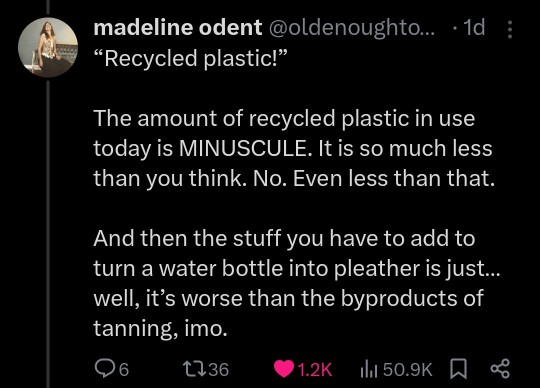

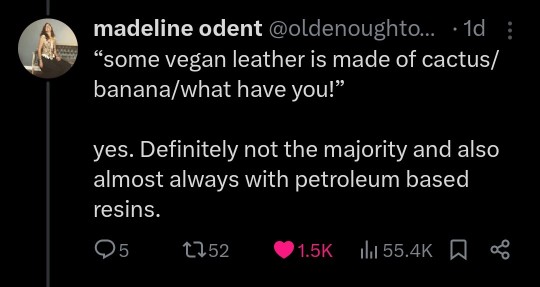

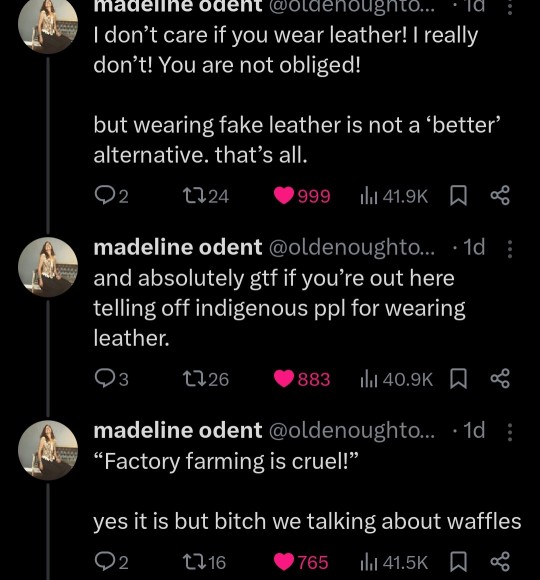
3K notes
·
View notes